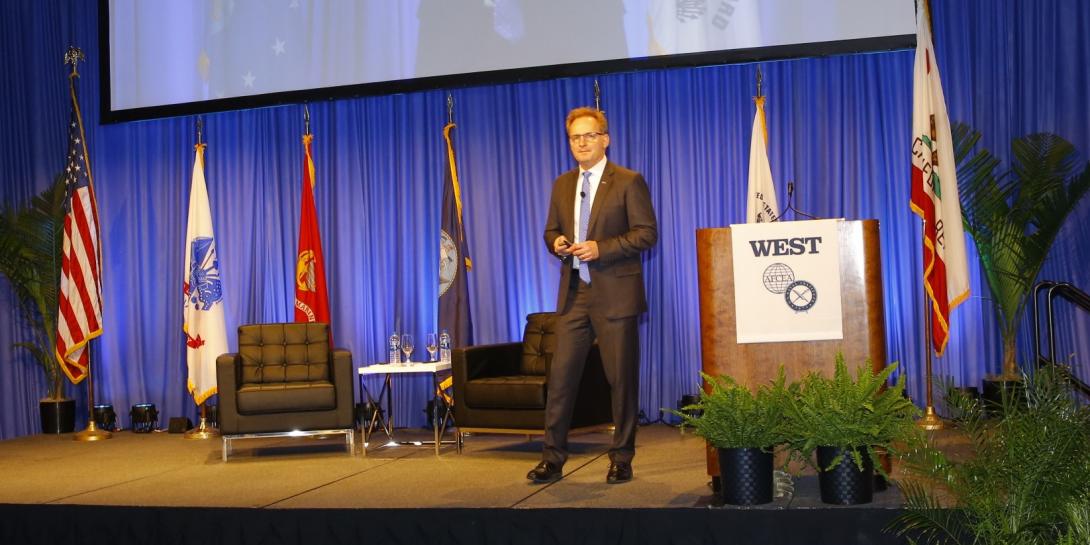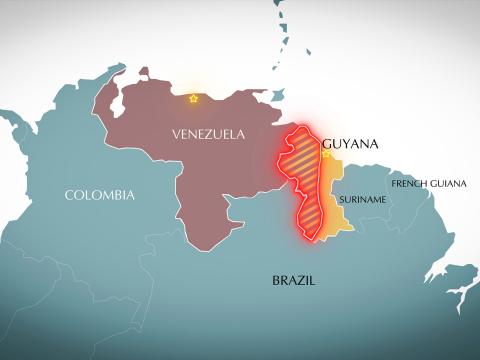Playing 'Small Ball' in the Indo-Pacific
China is investing heavily in the Indo-Pacific, a critical region of the world for strategic purposes, and luring poorer countries away from the United States, said Thomas Modly, undersecretary of the Navy.
Modly made the comments during an afternoon luncheon address on the first day of the West 2019 Conference in San Diego.
He described Chinese mercantilism as one of biggest challenges the U.S. faces. “We see how the Chinese are emphasizing their economic prosperity and growth … and what they’re doing to expand their influence around the world is quite striking and stunning and something we should be very concerned about because it manifests itself in lots of different ways—not just what they’re doing but how it influences our relationships with our partners and allies around the world.”
He reported taking a trip this past summer to the Pacific Islands, during which he visited a number of countries. In Micronesia, he saw a team of 24 Navy Seabees building a school out of plywood, concrete and corrugated steel for the roof. “It’s great. Great kids are out there doing the work, great connections with the local community,” he said. “Right next door, a great big sign, Micronesia Agricultural Center, is being paid for and built by the Chinese government. So, I kinda got the sense we’re playing small ball in a lot of these areas.”
Government leaders in the region indicate they prefer working with the United States, but they need the kinds of investments the Chinese are willing to make.
"I went on a trip this summer to the Pacific Islands. In every one of these locations, the Chinese are there, and they’re very aggressive. A lot of these countries are poor, and the checkbook that the Chinese show up with is very enticing to them,” Modly said. “While they would rather not have to deal with [China], they do have massive infrastructure needs, and the Chinese are there and they’re investing.”
He added that the United States is “doing the best we can,” but “I don’t think we have a great whole-of-government strategy for how to deal with China in this particular area. We need to think about that much more strategically and how we might want to challenge that.”
Thomas Modly, under secretary of the Navy, says that the minds of sailors and Marines will be a competitive advantage. "That’s what will differentiate us from our competitors, and we need to invest in that."#WEST2019
— George Seffers (@gseffers) February 13, 2019
Modly also listed cyber espionage as a major challenge. “We are in the midst of a conflict right now with major competitors around the world. Some are state sponsored and some are not. But they’re coming at us through our networks and our vulnerabilities, and they’re stealing from us,” he pointed out. “They’re stealing intellectual capital, and they’re doing this without any type of response that is stopping them right now.”
Thomas Modly, under secretary of the Navy: Strategic thinking in today’s context means you have to have an understanding of what cyber is. #WEST2019
— George Seffers (@gseffers) February 13, 2019
The undersecretary described cyber vulnerabilities as “critical to how we operate,” saying he is most concerned about weaknesses at the tactical edge and elsewhere. “We worry about it there, but there’s also the concern our vulnerabilities may be so great that we may not be able to get our ships underway in San Diego if they hit us in a certain way. I take this very seriously,” Modly said.





Comments